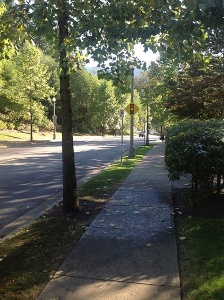
Honeydew is one of the most common tree care issues we see in the DC Metro Area. You may not be familiar with the name but you’re probably familiar with the issue. Have you ever encountered annoying sticky sap coating your car, furniture, or walkway that’s under a tree? That’s Honeydew. This plant health issue can be extremely frustrating for homeowners because it’s difficult to remove, accumulates dirt, and attracts flies and other annoying insects. But on top of the annoyance, this is a sign that your tree is suffering from a health issue.
What Is Honeydew?
Honeydew is the excrement of plant-sucking insects. This sticky substance is usually the first sign homeowners notice of an insect infestation. Many homeowners actually confuse honeydew with sap and only call us because the “sap” is a nuisance. They are usually surprised to hear that the problem they are dealing with is honeydew, which is a sign of an insect infestation. Honeydew itself will not damage to your tree; however, the insect infestation that causes it can weaken your tree overtime causing an overall decline in your tree’s health and vitality. With honeydew, you also run the risk of developing Sooty Mold which can cause additional issues.
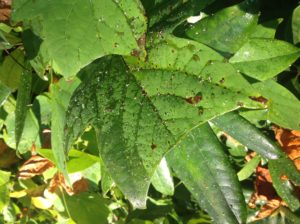
What Is Sooty Mold?
Sooty mold is a fungus that grows on top of honeydew and coats the leaves of your trees to the point where they can no longer absorb sunlight. This interrupts photosynthesis and the tree will not be able to produce the nutrients they need for survival. If your trees and shrubs are turning black you most likely have a sooty mold problem caused by an insect infestation.
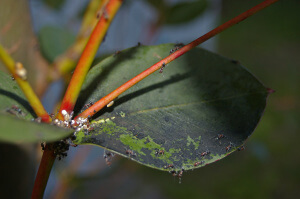
Susceptible Trees: Insect infestations that lead to honeydew & sooty mold are frequently found on azalea, rhododendrons, rose, ash, oak, fir, pine, spruce, cedar, hackberry, tulip poplar, elm, maple, willow, and fruit trees.
What Type Of Insect Causes Honeydew & Sooty Mold?
Honeydew is caused by an infestation of plant-sucking insects. Plant-sucking insects are insects that feed on the fluids from the plants’ photosynthetic tissues. Any plant-sucking insects can cause honeydew; however, the most common plant-sucking insects we see in our area include; lace bugs, various species of soft scale, and aphids.
Lace Bugs:
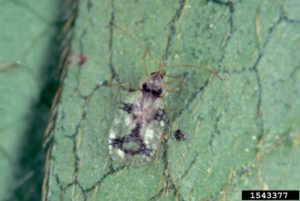
Lace bugs are plant-sucking insects that belong to the Tingidae family. These small ¼ inch long insects have wings that resemble lace and feed on the fluids from the plants’ photosynthetic tissues. With multiple generations a year these lace bugs will feed on your trees and shrubs from spring until fall creating honeydew, sooty mold, and turning the leaves a sickly white color. But the infestation doesn’t stop when the cold weather comes. The lace bug eggs overwinter in the leaves so that they can hatch and come back next spring to do more damage.
Targets: Azaleas, Rhododendrons, and other plants in the heath family
Learn more about Lace Bugs
Scale:
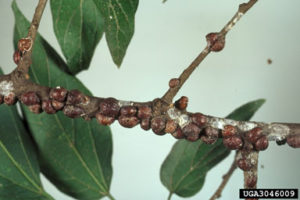
Scale is a general term to describe a group of tiny insects that attach themselves to trees and shrubs to feed off of the sap the plants produce. These insects range from 1/16th inch to over ¼th inch and resemble narrow fans, oysters, turtles, and barnacles, depending on the type. Scale are separated into two types; armored and soft scale. Soft scale is the kind that produces honeydew. Common types of soft scale include Azalea Bark Scale and Lecanium Scale.
Targets: Azaleas, Rhododendron, Huckleberry, Andromeda, Hawthorn, Popular, Maple, Oak, Linden, Birch, & Willow.
Learn more about Scale
Aphids:
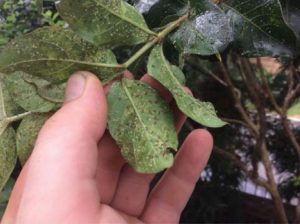
Aphids, also known as plant lice, are among the most destructive tree bugs. These small sap-sucking insects are members of the superfamily Aphidoidea. On top of creating honeydew and attracting sooty mold, Aphids weaken the plant and are vectors for other plant diseases. Because of their ability to asexually reproduce aphids rapidly grow in number and are difficult to control/eliminate.
Targets: Many species including Ash, Crape Myrtles, Fir, Pine, Spruce, Cedar, Hackberry, Roses, and Tulip Poplars.
Learn More About Aphids
Many of our clients have had serious problems with Honeydew and Sooty Mold staining their sidewalks, fences, and house siding black. If you are having issues from Honeydew and Sooty Mold our arborist will be able to determine if it’s being caused by aphids, scale, or other plants sucking insects and recommend the appropriate treatment.
TREATMENT FOR Honeydew & Soot Mold:
To keep honeydew and sooty mold from accumulating on your tree you must suppress the plant-sucking insects that create the sticky substance. To achieve this you have several options.
Traditional Control: Depending on the type of insect, our Arborists and Plant Health Care Technicians will use horticultural oils and insecticides to kill and control the insect infestation this year and prevent it in the following years. Depending on the severity of the sooty mold and the time of the year, our Arborists may also suggest cleaning off the sooty mold by using a hose and a soap solution.
Organic Control through Beneficial Insects: Aphids, lace bugs, and scale have many natural enemies. We can release these predators on your property in order to control the population of these aphids. This is a great option for homeowners that are worried about chemicals on their property or have kids that would love to be involved in releasing the bugs on the property.
Lace Bug Natural Enemies: jumping spiders, assassin bugs, lacewings larvae, and ladybugs
Scale Natural Enemies: lady beetles, predatory mites, and small parasitic wasps
Aphid Natural Enemies: lacewing larvae and ladybugs
Prevention: Most insects are more likely to feed on stressed trees. Maintaining the health and vigor of your trees can help protect against an infestation of plant-sucking insects. You can maintain the health of your tree through routine pruning, bio-stimulant applications, and seasonal sprays.
If your tree is having issues with honeydew and sooty mold give us a call at 703-573-3029 or use our online booking system to book a consultation with a Certified Arborist.
